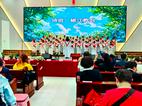There are great differences between Chinese churches and foreign churches, and one of the most important differences lies in the issue of denomination. For several hundred or even a thousand years, the Western churches have experienced an era of denominationalism. Only in recent decades has the trend moved toward post-denominationalism, resulting in the emergence of many independent churches. However, because the Chinese churches have been non-denominational for some time, some church elders, based on their past experiences, believe that denominationalism is displeasing to God and therefore oppose the establishment of denominations.
Pastor Yeh serves a church in a city in southern China. According to his prediction, it is likely that Chinese churches will face an era of re-denominationalization in the future and that it is an inevitable development in history.
Pastor Yeh points out that as early as the early 1900s, the Chinese church proposed building the "Church of Christ in China" and eliminating most of the Western denominations. This is because denominationalism caused many problems and even led to great divisions within the churches in China. Therefore, the Chinese church wanted to transform these Western-built churches into Chinese-owned churches. However, in the process of development and maturation, a diversity of theology emerged within these Chinese-built churches, and the churches came to have different theological positions, and a new wave of re-denominationalization is again being generated among the churches.
So how can the issue of denominationalism be addressed more positively? Pastor Yeh shares that no denomination can represent the full Christian faith, whether it is the Charismatic, Fundamental, or Reformed churches.
"At the very least, many churches have done some reflection and have tried to develop a relationship between their core beliefs today and history. Personally, I believe that in the next ten to fifteen years, even in relatively conservative churches like the one where I serve, there will be more denominationalization, and it is inevitable.
However, Pastor Yeh also notes that many people still do not see the need for denominationalization, and many who have not had thorough theological reflection would consider themselves evangelicals.
"This group is so similar to our church that if we are to formulate and improve our own system, it is most likely that we will take their direction.”
Pastor Yeh believes that an era of re-denominationalization will come upon the Chinese churches. Will there be a proliferation of denominations, leading to many conflicts between different denominations?
"Even if many denominations are established, they will not fight to the death like in the past," he said.
Re-denominationalization does not necessarily lead to conflict between churches of different denominations. "Actually, I don't think there should be conflict. As long as a church does not undermine even the basic beliefs of Christianity, there should be no conflict in legitimate churches," said Pastor Yeh. Even with different people and different ideas, it is perfectly possible for different denominations to coexist without attacking each other.
"Re-denominationalization is a matter of time. Denominations will surface; that is, many churches will reveal their denominational identity. In fact, many pastors today already have a clear theological position of their own and are well aware of the direction and model they should follow in leading their churches. Although they may not have made their position public for fear of criticism, misunderstanding, or various other reasons, extensive preparatory work has already been done.
Therefore, Pastor Yeh said that the Chinese churches have now come to a crossroad, and it can be expected that some Chinese churches will be more diversified in form in the future. And pastors, especially those of large churches, should prepare themselves for this impact and the subsequent era of church diversity.
- Translated by Joyce Leung












